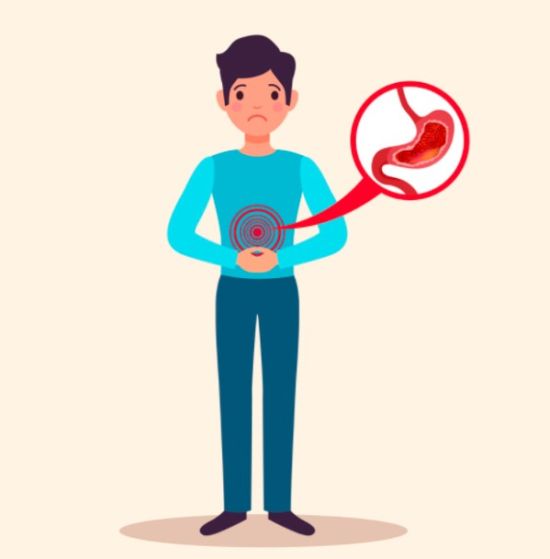When choosing a medicine for reflux, it is important to seek medical and pharmaceutical advice so as not to end up making the problem worse. To help you, we explain a little better about the condition and when the medicine is needed!
In this article you will find:
- What is reflux?
- What is good for reflux?
- What is the best medicine for reflux?
- Can babies take medicine for reflux?
- Home Remedy for Reflux: How to Alleviate Symptoms?
What is reflux?
Reflux is a common condition, which, in most cases, does not cause major problems, as it occurs in isolation. But if the frequency is high, this discomfort can become a health problem. In short, it occurs when there is a return of stomach contents to the esophagus, possibly reaching the throat. However, over time, the mucous membranes can suffer aggression due to the acidity of the gastric juice.
Excess weight, smoking, excessive alcohol consumption, presence of hernia in the digestive system, pregnancy, poor diet and stress are the main risk factors for reflux to happen.
You can better understand about the condition at: What is reflux? Differences between the digestive and the heart.
Among the symptoms most reported by patients are:
- Heartburn: burning sensation in the chest and radiating to the throat;
- Regurgitation: return of acidic food or liquid to the mouth.
What is good for reflux?

To alleviate reflux, you should avoid fatty foods or foods that have caffeine, alcohol, pepper, mint and mint, in addition to not consuming fizzy drinks (such as soft drinks). Antacid drugs can be used to relieve symptoms caused by reflux, as their effect neutralizes stomach acid, reducing burning.
The most used are those that contain aluminum hydroxide, magnesium hydroxide and calcium carbonate in their composition.
However, these medications can cause the “rebound effect”, causing further worsening of symptoms. In other words, their frequent use, just alleviating the symptoms, can cause an increase in stomach acidity, which aggravates the symptoms.
To avoid the rebound effect and other complications, . Always consult a doctor or pharmacist before taking any medicine for reflux or other illness/symptom.
What is the best medicine for reflux?

The reflux in the throat presents symptoms such as hoarseness, bad breath, local pain and dry cough.
There are three types of reflux remedy in this case:
- Antacids: neutralize acids produced in the stomach;
- H2 receptor antagonists: block the reception of histamine, which prevents the release of hydrochloric acid (stomach) and reduces stomach irritation;
- Proton pump inhibitors: suppress gastric acid production.
The vast majority of medicines are in tablets that must be swallowed whole, that is, without chewing or breaking. As for those that are antacid tablets, most must be chewed or dissolved in the mouth.
There are also options in drops (usually given to children) and injectable (which must be applied by a health professional).
But generally speaking, the most common list of remedies for reflux is as follows:
Omeprazole
Omeprazole is a very popular drug indicated for the treatment of benign peptic ulcers, gastric hyperacidity and prevention of the return of these conditions. Its presentation is in pills, being a proton pump inhibitor agent. The dosage depends on medical advice, but the advice is that it should be used before breakfast.
Ranitidine
Ranitidine is a medicine in tablets mainly indicated to treat ulcers in the stomach or duodenum and problems related to reflux. The substance ranitidine reduces the amount of acid that is produced in the stomach, reducing irritation and resulting symptoms.
The tablet should be swallowed whole with water. The dosage should always be guided by the doctor or physician, but, in general, the drug can be used once a day, preferably at night, or even 2-3 times a day, as needed.
Dexilant
Dexilant is a drug (in tablet) indicated for adults (over 18 years old), which combats heartburn, burning and the sour taste caused by reflux. This drug is indicated for reducing acidity in the stomach and the dosage varies depending on the medical history and the severity of each case.
People who have liver problems, osteoporosis, pregnant and breastfeeding women cannot consume this medicine, which belongs to the category of proton pump inhibitors.
Bromopride
Bromopride can be found in several forms: pills, injections and drops. Since the dosage of each presentation can be prescribed by a physician according to the needs of each patient. People with epilepsy and babies under 1 year of age cannot take this drug, as it is a D2 (dopamine) receptor antagonist.
Lansoprazole
Lansoprazole is indicated to aid the healing of wounds in the digestive system that are caused by acid from regurgitation. In short, this remedy takes an average of 2 hours to act and its effect lasts almost 24 hours, as it is one of the proton pump inhibitors and provides a prolonged decrease in acidity in the stomach.
Frequent drinkers of alcohol and people with liver problems should report these conditions to their doctor before taking Lansoprazole.
Luftagastropro
Luftagastropo is an antacid remedy that prevents reflux for 4 hours, relieving symptoms. It is sold in bottles or sachets (both in liquid) and forms a gel when it reaches the stomach, so it starts to take effect 15 seconds after ingestion.
However, children (under 12 years of age) and people with kidney problems cannot take this medication unless under medical advice.
Bisured magnesia
Another remedy for reflux is bisurada magnesia, which relieves burning, heartburn and pain caused by the condition. Children, people with kidney and calcium problems can take this antacid remedy only under medical advice.
Its presentation is in tablets (which must be chewed or dissolved), which do not need to be ingested with water. However, a maximum of 10 tablets should be consumed per day with minimum intervals of 1 hour.
Droxaine
Droxaine contains substances that neutralize the acids formed by the stomach. In this way, you can combat reflux symptoms (pain, burning and heartburn). In addition, the drug helps to reduce pain due to the presence of an anesthetic substance in its composition.
This antacid drug cannot be used by children, pregnant women, nursing mothers, people with kidney complications or suspected appendicitis, unless under medical advice.
Can babies take medicine for reflux?
Reflux in babies is common, but most medications to combat this condition and its symptoms are age-restricted and are not indicated for newborns and babies under 1 year old. Therefore, in case of doubt, take the baby to the pediatrician, who will be able to evaluate and prescribe the best medicine for reflux.
In general, the condition is common, as their digestive system is still getting used to digesting milk. Therefore, it should not be a reason for concern if it occurs after a feeding or with a low frequency.
On the other hand, if it is frequent, lasting longer after breastfeeding, or accompanied by symptoms such as regurgitation, irritation, crying and refusal to breastfeed, it can hinder the baby’s development. Therefore, if the reflux is persistent or accompanied by other symptoms, medical evaluation is required.
Try to prevent reflux before it happens. Therefore, avoid rocking the baby during breastfeeding, burp him after nursing and lie on his back.
Home Remedy for Reflux: How to Alleviate Symptoms?
Although not proven to be effective by scientists, some home remedies (such as teas and juices) can improve reflux symptoms. Some common ingredients (eg lemon and ginger) can also be added to combat this problem in everyday life. Check out some options:
Chamomile tea
Drink 2-3 cups of chamomile tea a day. This plant helps to calm the stomach and control digestion naturally.
Ginger
Ginger speeds up digestion so that food spends less time in the stomach. Therefore, it can be consumed frequently by people who have reflux problems.
If the temperature is high, put some ginger chips into a small bottle of water and consume this drink throughout the day. If the thermometers are lower, you can make tea with the root or even add it to hot dishes.
Lemon
Like ginger, lemon can be used in a variety of ways: juices, spices and preparations for various dishes can include fruit.
There are those who consume the fruit to assist in the production and regulation of gastric juice, but this recipe cannot always help. Its acidity can increase irritation in areas that have already been damaged by reflux.
Therefore, the prevailing rule is to notice if there is a worsening of the symptoms with the consumption of the fruit. If not, putting it on the diet is allowed.
Apple
Apples help neutralize stomach acids, which helps to reduce stomach discomfort caused by reflux. Therefore, eat 1-2 units of fruit every day, especially after heavier meals (lunch and dinner).
Aloe Vera (Aloe)
Aloe Vera improves intestinal flora and helps with detoxification and blood circulation. It contains vitamins (B and C), iron, copper, calcium, potassium and manganese which work to relieve the pain and burning caused by reflux.
Whenever possible, consume this ingredient. Drinking two glasses of Aloe Vera juice every day also fights reflux.
Reflux is a complication that can present with signs such as burning and burning. Taking care of food and changing behavioral habits (smoking and sedentary lifestyle, for example) are measures indicated to combat reflux.
But in some cases, medications may be needed to bring relief to symptoms. Always avoid self-medication. Before taking any drug, consult a health professional.







